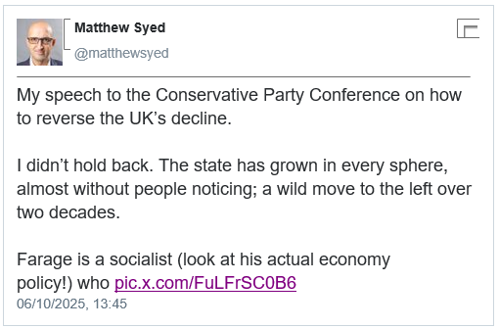
How to reverse the UK’s decline. Thought leadership from Mathew Syed
07/10/2025
Matthew Syed, a prominent columnist for The Times, has recently contributed a series of thought leadership pieces and interviews addressing the UK’s relative economic, political, and cultural decline.
- His commentary spans both written columns and in-depth interviews, particularly on Times Radio and YouTube.
- And he spoke at the Conservative Party Conference on how to reverse the UK’s decline. And he didn’t hold back.
- He argues that the state has expanded in every sphere, largely unnoticed by the people, marking a significant shift to the left over the past two decades.
Watch him here:-

Here are some other key themes from his recent thought leadership themes in Syed’s Analysis of UK Decline
- Political Paralysis and Lack of Vision
In a Times Radio interview, Syed
- argues that Labour under Keir Starmer is “completely failing” to address the UK’s long-term decline.
- criticises both major parties for lacking the courage and imagination to tackle structural issues, calling for a radical rethinking of national priorities.
- Cultural and Institutional Stagnation
Syed believes the UK is becoming “increasingly irrelevant” on the global stage. He attributes this to:
- A failure to invest in innovation and education.
- Over-centralisation of power in Westminster.
- A political culture that rewards short-termism over long-term strategy.
- Decline in Global Perception
In another interview,
- he notes that while Britain isn’t “broken,” it is not thriving either.
- He highlights how international perceptions, especially from the U.S., see the UK as in decline, even if the lived experience within the country is more nuanced.
- Call for Cognitive Diversity and Growth Mindset
Drawing from his book Rebel Ideas, Syed emphasises the need for cognitive diversity in leadership and policymaking. He argues that solving complex national problems requires diverse perspectives and a growth mindset, a theme he explores in both his consulting work and public speaking engagements.
- Warnings on Social Fragmentation
In a more provocative discussion, Syed warns of deepening social fractures in the UK and France, citing issues like tribalism, failed integration, and political cowardice. He argues that unless these are addressed head-on, both countries risk further unrest and decline.
Syed’s Prescriptions for Reversing Decline
- Radical institutional reform: Decentralise power and empower local governance.
- Invest in education and innovation: Shift focus from legacy industries to future-facing sectors.
- Foster a culture of openness and learning: Encourage failure as a learning tool, not a stigma.
- Promote diversity of thought: Move beyond echo chambers in politics, media, and business.
- Rebuild national confidence: Through competence, not nostalgia.
References
The Team
Meet the team of industry experts behind Comsure
Find out moreLatest News
Keep up to date with the very latest news from Comsure
Find out moreGallery
View our latest imagery from our news and work
Find out moreContact
Think we can help you and your business? Chat to us today
Get In TouchNews Disclaimer
As well as owning and publishing Comsure's copyrighted works, Comsure wishes to use the copyright-protected works of others. To do so, Comsure is applying for exemptions in the UK copyright law. There are certain very specific situations where Comsure is permitted to do so without seeking permission from the owner. These exemptions are in the copyright sections of the Copyright, Designs and Patents Act 1988 (as amended)[www.gov.UK/government/publications/copyright-acts-and-related-laws]. Many situations allow for Comsure to apply for exemptions. These include 1] Non-commercial research and private study, 2] Criticism, review and reporting of current events, 3] the copying of works in any medium as long as the use is to illustrate a point. 4] no posting is for commercial purposes [payment]. (for a full list of exemptions, please read here www.gov.uk/guidance/exceptions-to-copyright]. Concerning the exceptions, Comsure will acknowledge the work of the source author by providing a link to the source material. Comsure claims no ownership of non-Comsure content. The non-Comsure articles posted on the Comsure website are deemed important, relevant, and newsworthy to a Comsure audience (e.g. regulated financial services and professional firms [DNFSBs]). Comsure does not wish to take any credit for the publication, and the publication can be read in full in its original form if you click the articles link that always accompanies the news item. Also, Comsure does not seek any payment for highlighting these important articles. If you want any article removed, Comsure will automatically do so on a reasonable request if you email info@comsuregroup.com.


